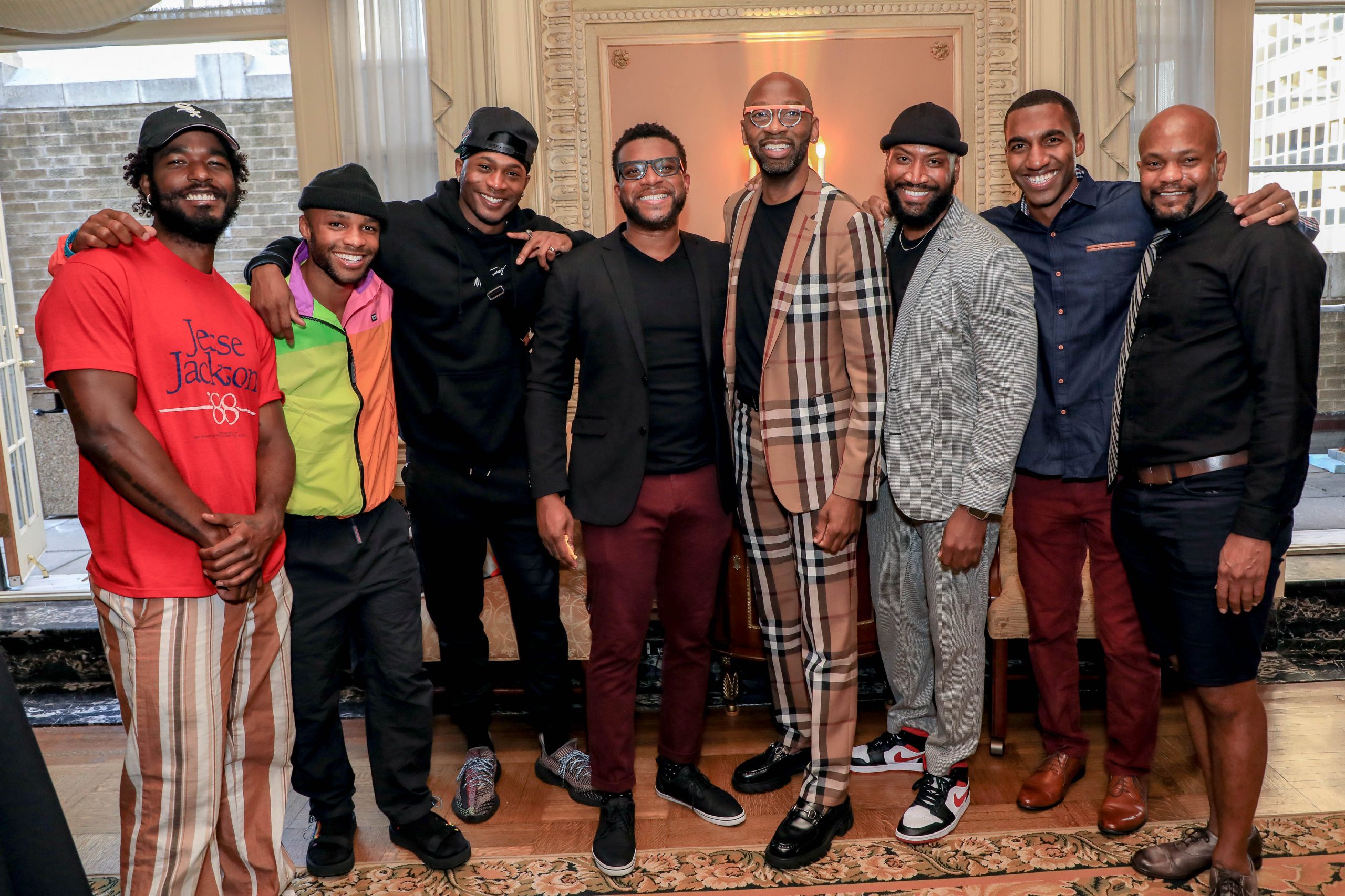Keenan Scott II: A new voice on Broadway
The playwright brings ‘Thoughts of a Colored Man’ to Broadway after a 15-year journey—both literal and internal
Things aren’t like they used to be. Which isn’t necessarily a bad thing.
That’s true here in Brooklyn—Downtown has changed drastically over the past two decades, to say nothing of the Navy Yard, of Bed-Stuy and beyond.
Of course, things are never quite like they used to be. (And maybe they never were the way we thought they were.)
Still, the forces driving change here in Brooklyn specifically—but also across the cultural landscape—take center stage this fall. Literally: “Thoughts of a Colored Man,” a poetic new production that fuses spoken verse, music, song and dance, has arrived on Broadway, bringing with it an exploration of the vibrant inner lives of proud Black men in Brooklyn today.
The production marks the Broadway debut of playwright Keenan Scott II. And in order to get here, he needed to take a detour through Maryland first.
Growing up in Queens in the late 1980s-’90s, Scott would visit his grandfather in Downtown Brooklyn, just off the Navy Yard, an area that Scott says no one would go to “unless you were from there or you had family there.” His folks pulled up stakes in 1996, moving 15-year-old Scott to the suburbs of Washington, D.C., where he started performing his slam poetry at clubs in the nation’s capital. He would go on to study acting at Frostburg State University in Maryland, where the professors stuck to the classics.
“[I] didn’t see myself or my community in any of the plays that I was reading,” he says. So he set out to change that, by building a narrative out of his best poems. In writing what would become the first iteration of “Thoughts of a Colored Man,” Scott hoped to “create something that embodied what I came from in my upbringing, of coming up in the projects of New York.”
Fifteen years later, he’s done just that. Scott, now 34, returned to Brooklyn five years ago, finding it nearly unrecognizable. His grandfather’s old neighborhood had become crammed with skyscrapers, high-rise condominiums, fancy restaurants and parks. He poured his own sense of displacement and mixed feelings about gentrification into subsequent versions of “Thoughts of a Colored Man,” which follows seven Black men navigating a changing landscape around them over the course of 24 hours around a neighborhood that feels like Bed-Stuy, Fort Greene and Clinton Hill rolled into one.
They come together in a barbershop and, through a series of related vignettes, the audience sees the characters discuss gentrification and materialism, gun violence, racial and sexual identity and what it means to be part of a community. Their names, perhaps a bit on the nose, are Wisdom, Passion, Depression, Lust, Happiness, Love and Anger. The central question—tackled with as much humor as gravitas—is “Who is the colored man? Is he a king or is he a slave?”
“Thoughts” premiered on Broadway on October 13 at the John Golden Theater (it had initially be slated for October 31), in what Vogue has called “a clear-eyed and lyrical look at contemporary Black manhood.” The ensemble cast features Dyllón Burnside (“Pose”), Bryan Terrell Clark (“Hamilton”), Da’Vinchi (“Black Mafia Family”), Grammy Award nominee Luke James (“The Chi”), Tony Award nominee Forrest McClendon (“The Scottsboro Boys”), Grammy nominee Tristan “Mack” Wilds (“The Wire”), and Tony nominee and Emmy winner Keith David (“Seven Guitars,” “Greenleaf”).
“Literally the first thing I said to myself, walking up, seeing my marquee for the first time was like, oh shit, we on the same street as ‘Lion King’,” says Scott. “Never would have imagined that.”

Left to right: Luke James, Dyllón Burnside, Da’Vinchi, Keenan Scott II, director Steve H. Broadnax III, Bryan Terrell Clark, Garrett Turner, Forrest McClendon(Photo: Tricia Baron)
‘A full, human story’
Like the borough it depicts, “Thoughts of a Colored Man” has come a long way since Scott first started writing it at 19. “As I evolved and grew up in life, [so did] the characters,” says Scott. “I found more nuances in their experiences as I experienced more about the world.” (Another Brooklynite, Walt Whitman, famously kept iterating on “Leaves of Grass” throughout his life.)
The story is both a portrait of a neighborhood (and a world) undergoing tectonic shifts in a universal, almost cinematic illustration of the human experience. Scott wants you to see color, but is insistent that “Thoughts of a Colored Man” is a show made for everyone.
“If you can’t relate to losing and finding love—having a job you don’t like, ancestry and grandparents, seeing your neighborhood change—if you can’t relate to those things, then I think the problem lies within you and not me, right?” says Scott.
“Thoughts” seems to be part of a broader cultural moment, too. The piece is just one of seven new Broadway plays joining this fall’s lineup—not including musicals—that are written by Black playwrights.
“Keenan’s play has been one of my favorite journeys,” producer Brian Moreland said in a statement. “More than ever, it is vital for Broadway and theaters across America to make room for the next generation of theater makers: to celebrate their communities, to feel their heartache, and to hear the stories they are ready to tell.”
To tell those stories, Scott draws his influences from multiple art forms beyond theater—jazz, painting, film. Spike Lee, another Brooklynite, in particular was an early influence.
“There wasn’t a lot of great or positive images as a young Black boy watching entertainment [growing up],” Scott says. “So having somebody like Spike create those types of characters and be a champion of the city of New York and be kind of like the poster child for that was what had a big impression on me as a kid.”
Just as Lee has refused to portray young, Black men as a monolith or as stereotypes—athletes, criminals, musicians—“Thoughts” aims to give a holistic view of the Black experience, not one that is merely defined by America’s racist systems.
“You don’t often see stories where Black characters can exist without white counterparts and that comparison,” says Scott. “So in ‘Thoughts of a Colored Man,’ I wanted to tell a full human story with these men that happened to be Black and see them in their environment, in their own situations and show them in totality from love, joy, happiness, depression, sorrow, and all of the above. I wanted to create a piece like that to really show our humanity.”
Of course, “Thoughts of a Colored Man” does arrive as the country is struggling with a reckoning of its own racist history. So while Scott does not write for the white gaze—“the white male should not be the standard for storytelling, or in any medium”—he appreciates the importance of his play in breaking down barriers for other Black artists and for generating a greater sense of understanding. (It might finally be time to retire Broadway’s nickname, “The Great White Way.”)
“Once we really allow our stages, our TV screens, our film screens to reflect the true diversity and an array of the society we actually live in,” he says, “the better things would be.”
Or, to put it another way: Things aren’t like they used to be. Which isn’t necessarily a bad thing.
A few of Keenan Scott II’s favorite things
What are you listening to these days?
I’ve been listening to a lot of Nas, like I always do. “King’s Disease II.” I’ve also been listening to, even though he’s a singer, a lot of BJ The Chicago Kid, he just dropped a four-song EP. Vince Staples. Tyler, the Creator and what he does musically is great.
Favorite films?
Oh, god. “Do the Right Thing.” People are always shocked when I say it, but one of my favorite films of all time, it might be my favorite film of all time, is “Bicentennial Man.” I’m a huge, huge Robin Williams fan.
Favorite plays?
Katori Hall is my favorite contemporary playwright. I love “Hot Wing King,” but my favorite piece from Katori is definitely “Hurt Village.” August Wilson, his whole cycle, but my favorite out of the cycle would have to be probably “King Hedley II” and “Jitney.”
Favorite places to eat in Brooklyn?
Beso and Peaches.
This article first appeared in the Fall 2021 issue of Brooklyn Magazine. Click here to subscribe today.
You might also like 


























